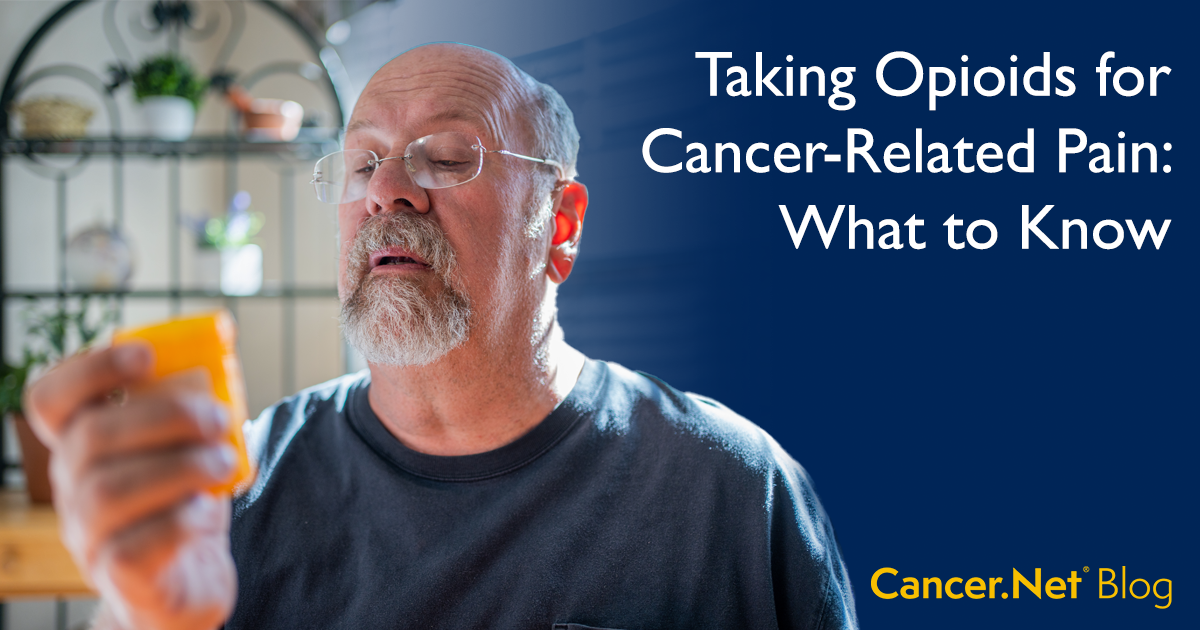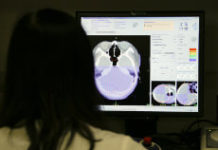
Jennifer Jacky, MSN, ARNP, is a nurse practitioner who works with people with head and neck cancer or lung cancer. She is passionate about helping patients manage symptoms during cancer treatment and loves being a part of cancer research because clinical trials can help patients receive tomorrow’s treatment today. Cristina P. Rodriguez, MD, is a medical oncologist at Seattle Cancer Care Alliance specializing in the treatment of head and neck cancers. She is also the 2023 Cancer.Net Associate Editor for Head and Neck Cancers. You can follow Dr. Rodriguez on Twitter. Ms. Jacky has no relationships to disclose related to this content. You can view Dr. Rodriguez’s disclosure information in her individual biography linked above.
Despite the many improvements in cancer treatments, pain in people living with cancer is common. Pain may be caused by the cancer itself, such as when a tumor presses on surrounding nerves and tissues, or can be experienced during or after receiving certain cancer treatments.
Controlling pain and other symptoms is a very important part of cancer care because it helps improve a person’s quality of life. Research suggests that people who have a good quality of life during their cancer treatment may live longer than those who do not. Here, learn more about how opioids play a role in managing cancer-related pain and the common concerns people have while receiving this type of medication.
How pain is managed during cancer
If you are experiencing pain during cancer, your health care team will first try to determine what is causing the pain. Then, they will offer options to help control it. You may be offered non-medication options, such as physical therapy, mindfulness, or acupuncture. In some situations, radiation therapy or surgery may also be recommended to help manage pain.
Many types of cancer-related pain, however, are controlled using a type of medication called an “analgesic,” which is a pain medication often taken by mouth. For mild pain, some over-the-counter medications like acetaminophen or ibuprofen may be recommended. However, these medications can irritate your liver and/or kidneys, cause bleeding, or reduce the chance of fevers. Therefore, they may not be safe during specific cancer treatments.
Other times, a different type of medication called an opioid may be recommended. Opioid medications, which are sometimes called “narcotics,” are strong pain relievers that are recommended to control moderate to severe cancer-related pain. Some examples of opioids include hydrocodone, oxycodone, and morphine. Opioids have been shown to be effective and safe for people with cancer-related pain when they are carefully managed. Opioids are convenient for patients to take outside of the hospital and can come in many forms, including pills, liquids, or patches placed on the skin.
Always talk with your doctor about what type of pain management is recommended for you, and be sure to bring up any questions or concerns you have with them about any treatments you are prescribed.
What to know if you are prescribed opioids for cancer-related pain
As with any medication, opioids have risks associated with them, including sleepiness, constipation, and, if taken in high amounts or with other medications that cause similar side effects, can slow or even stop breathing. If you have been prescribed opioids, your health care team will educate you on the drug, start you at low doses, and monitor your side effects and pain carefully while you are taking the medication. It is important to track the amount of medication that you are taking, store these medications in a secure area, and not take more medication than what is prescribed without talking to your health care team.
If you are already prescribed an opioid medication for pain, your health care team will adjust your doses carefully to control your pain. Sometimes, it is safest for people with cancer to be admitted to the hospital for pain control so that opioid doses can be increased while they are monitored closely. Your doctor will discuss with you what they recommend for managing your pain based on your individual diagnosis and symptoms.
Common concerns when taking opioids for cancer-related pain
Many people with cancer are concerned when their health care team recommends opioid medication for managing pain. They often have fears about needing more and more of the pain medication to manage the same amount of pain, experiencing withdrawal symptoms, or becoming addicted to the medication. While these concerns are important, it often helps with these concerns to be clear on the definition of each of the terms. We encourage you to talk with your health team to see how these side effects can be monitored and avoided.
-
Opioid tolerance. Many people with cancer are concerned that they will require larger and larger doses of the opioid to control the same level of pain. While people with cancer may need more opioid medication over time, it is rare that a person will need rapid increases of medication to control the same pain problem. If you have problems with rapid opioid tolerance, your health care team will consider other options for managing your pain and may consult a pain specialist.
-
Opioid withdrawal. If you suddenly stop taking opioid medications, you will likely experience withdrawal symptoms, which may include nausea, diarrhea, and anxiety. Withdrawal refers to the physical or mental symptoms you experience when you reduce your use of or stop taking a drug. While uncomfortable, withdrawal symptoms can be managed and are rarely life-threatening. If you are taking opioid medication, make sure you call your health care team for refills several days in advance to avoid running out. When it is time to reduce or stop treatment with opioid medication, your health care team will reduce the medication slowly to prevent withdrawal symptoms.
-
Opioid addiction/substance use disorder. For the past 2 decades, there has been a dramatic increase in opioid-related deaths in the United States. This has sadly highlighted the risk of addiction or substance use disorder involving opioids. Some people who take opioids experience pain control along with other changes in their mood. For some people, the mood changes are described as a “high” or euphoria. Other people experience reduced anxiety. In general, people develop opioid use disorders when they take opioids for the medication’s mood-altering properties. If they continue taking opioids despite life changes caused by taking the medication, such as a loss of a relationship, job loss, or legal problems, they may have a substance use disorder.
While people with cancer who take opioid medication for pain control seem to be at low risk for this problem, it can still happen. If you or your family member has a history of addiction, it is very important for you to discuss this with your health care team. Remember, the purpose of pain management is to help relieve your pain throughout your cancer treatment and improve your functioning. Your health team will monitor you closely to make sure that this medication is helping and not hindering your ability to function.
If you do experience a substance use disorder during cancer, your health care team will treat it as an illness that needs treatment just like any other medical problem. They will consult addiction and pain experts with the goal of keeping you comfortable and safe during your cancer treatment.
If you are taking or are anticipating taking an opioid medication during cancer, talk with your health care team about any questions or concerns you have about them. Keeping you comfortable and safe is their top priority, and they will work with you to find the pain management techniques that are right for you.





